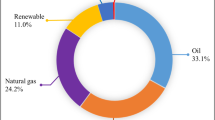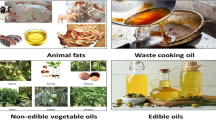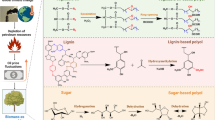Abstract
The primary problems associated with the use of pure vegetable oils as fuels in compression ignition (Diesel) engines are caused by high fuel viscosity. Transesterification of the oil with short-chain alcohols (such as methanol or ethanol) to corresponding fatty esters is the most promising solution to the high-viscosity problem. In this work, the transesterification method was applied to crude safflower seed oil of Turkish origin using methanol. The variables affecting the monoester yield, such as:
-
1.
Molar ratio of alcohol to vegetable oil;
-
2.
Reaction temperature; and
-
3.
Type and amount of alkali catalyst used
were investigated. In the presence of 1.0 wt% KOH as the reaction catalyst, 97.7% ester yield was achieved within 18 min at a reaction temperature of 69 ± 1‡C using 1:7 vegetable oil-alcohol molar ratio. A significant improvement was observed in viscosity and other physical properties with the ester product compared to the parent vegetable oil. ASTM fuel properties of the methyl ester product were in accordance with those obtained for commercial Grade No.2-D diesel fuel.
Similar content being viewed by others
References
Walker, J. N., DeShazer, J. A., and Barfield, B. J. (1992),Agricultural Eng. 75(6), 24–26.
Peterson, C. L. (1986),Trans. ASAE 29(5), 1413–1422.
Bandel, W. and Heinrich, W. (1982), inEnergy from Biomass, Strub, A., ed., Applied Science Publishers, London, New York, pp. 822–829.
Lipinsky, E. S., McClure, T. A., Kresovich, S., Otis, J. L., Wagner, C. K., Trayser, D. A., and Appelbaum, H. R. (1982), Vegetable Oil Fuels ASAE Publication,4–82, 1–10.
Quadflieg, H. (1985), inAlternative Uses for Agricultural Surpluses, Raymond, W. F. and Larvor, P. eds., Elsevier Applied Science, London, New York, pp. 11–40.
Mittelbach, M., Worgetter, M., Pernkopf, J., and Junek, H. (1983),Energy in Agriculture 2, 369–384.
Arida, V. P., Atienza, A., Borlaza, F. C., and Binlayo, D. L. (1983), inAlternative Energy Sources V. Part D: Biomass/Hydrocarbons/Hydrogen, Veziroglu, T. N., ed., Elsevier Science Publishers, Amsterdam, pp. 75–91.
IŞigigür, A., Karaosmanoglu, F., and Aksoy, H. A. (1989), Evaluation of vegetable oils as diesel fuel alternative. Proceedings of the 7th National Thermal Science and Technology Congress, Turkish Thermal Science and Technology Association, Izmir, pp. 189–196.
Wagner, L. E., Clark, S. J., and Schrock, M. D. (1984), SAE Paper No. 841385.
Fuls, J. and Hugo, R. A. (1981), On farm preparation of sunflower oil esters for fuel. Proceedings of the Third International Conference on Energy Use Management, Berlin, pp. 1595–1602.
Pischinger, G. H., Siekmann, R. W., Falcon, A. M., and Fernandes, F. R. (1982), Vegetable Oil Fuels ASAE Publication,4–82, 198–208.
Freedman, B. and Pryde, E. H. (1982), Vegetable Oil Fuels ASAE Publication,4–82, 117–122.
IŞigigür, A. (1992), Transesterification of safflower seed oil of Turkish origin and its evaluation as a diesel fuel alternative. Ph.D. Thesis, Istanbul Technical University, Istanbul.
Cocks, L. V. and Van Rede, C. (1966),Laboratory Handbook for Oil and Fat Analysts, Academic Press, London.
Kaufmann, H. P. (1958),Analyze der Fette und Fettprodukte, vol. 1, Springer-Verlag, Berlin, p. 360.
Kusy, P. F. (1982), Vegetable Oil Fuels ASAE Publication,4–82, 127–138.
Freedman, B., Pryde, E. H., and Mounts, T. L. (1984),J. Am. Oil Chem. Soc. 61, 1638–1643.
Hassett, D. J. and Hasan, R. A. (1982), Vegetable Oil Fuels ASAE Publication,4–82, 123–127.
Graille, J., Lozano, P., Pioch, D., Geneste, P., and Guido, A. (1982),Oléagineux 37, 421–424.
Freedman, B., Pryde, E. H., and Kwolek, W. F. (1984),J. Am. Oil Chem. Soc. 61, 1215.
Bondioli, P., Mariani, C., Fedeli, E., Gomez, A. M., and Veronese, S. (1992),La Rivista Italiana Delle Sostanze Grasse 69, 467–469.
Feuge, R. O. and Gros, A. T. (1949),J. Am. Oil Chem. Soc. 26, 97–102.
Gauglitz, E. J. and Lehman, L. W. (1963),J. Am. Oil Chem. Soc. 40, 197–198.
Lehman, L. W. and Gauglitz, E. J. (1966),J. Am. Oil Chem. Soc. 43, 383–384.
Schwab, A. W., Bagby, M. O., and Freedman, B. (1987),Fuel 66, 1372–1378.
Author information
Authors and Affiliations
Rights and permissions
About this article
Cite this article
Gigür, A.I., Karaosmanoglu, F. & Aksoy, H.A. Methyl ester from safflower seed oil of Turkish origin as a biofuel for diesel engines. Appl Biochem Biotechnol 45, 103–112 (1994). https://doi.org/10.1007/BF02941791
Issue Date:
DOI: https://doi.org/10.1007/BF02941791




